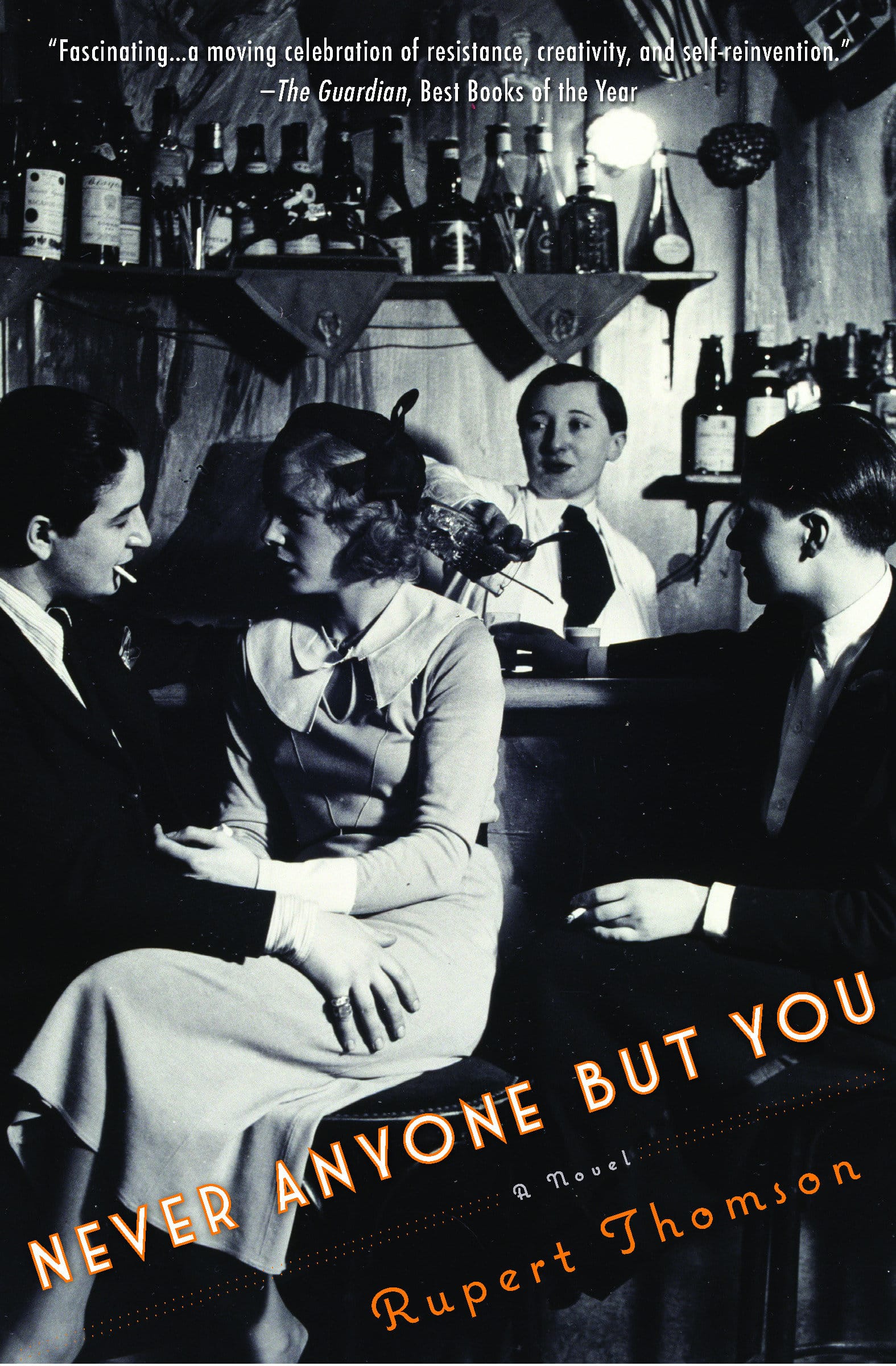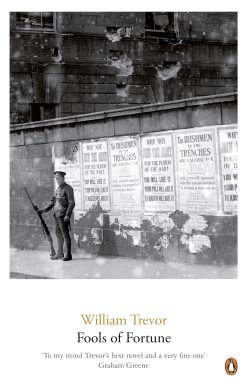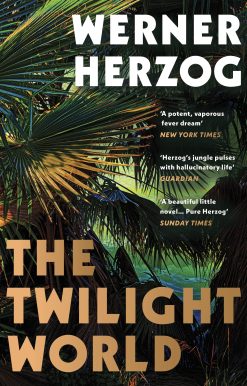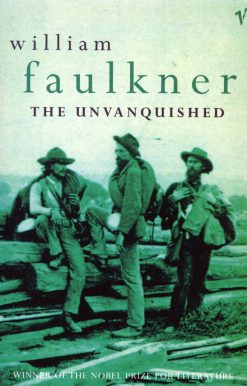Never Anyone But You: A Novel
14.00 JOD
Please allow 2 – 5 weeks for delivery of this item
Description
Named a Best Book of the Year by The Guardian, The Observer, PopMatters, and Sydney Morning Herald. A literary tour de force that traces the real-life love affair of two extraordinary women, recreating the surrealist movement in Paris and the horrors of the world wars with a singular incandescence and intimacy.In the years preceding World War I, two young women meet, by chance, in a provincial town in France. Suzanne Malherbe, a shy seventeen-year-old with a talent for drawing, is completely entranced by the brilliant but troubled Lucie Schwob, who comes from a family of wealthy Jewish intellectuals. They embark on a clandestine love affair, terrified they will be discovered, but then, in an astonishing twist of fate, the mother of one marries the father of the other. As “sisters” they are finally free of suspicion, and, hungry for a more stimulating milieu, they move to Paris at a moment when art, literature, and politics blend in an explosive cocktail. Having reinvented themselves as Claude Cahun and Marcel Moore, they move in the most glamorous social circles—meeting everyone from Hemingway to Dalí—and produce provocative photographs that still seem avant-garde today. In the 1930s, with the rise of anti-Semitism and fascism, they leave Paris for Jersey, and it is on this idyllic island that they confront their destiny, creating a campaign of propaganda against Hitler’s occupying forces that will put their lives in jeopardy. Brilliantly imagined, profoundly thought-provoking, and ultimately heartbreaking, Never Anyone But You infuses life into a forgotten history as only great literature can.
Additional information
| Weight | 0.37 kg |
|---|---|
| Dimensions | 2.85 × 13.29 × 20.2 cm |
| PubliCanadanadation City/Country | USA |
| by | |
| Format | Paperback |
| Language | |
| Pages | 368 |
| Publisher | |
| Year Published | 2020-3-3 |
| Imprint | |
| ISBN 10 | 1635420016 |
| About The Author | Rupert Thomson is the author of eleven highly acclaimed novels, including Katherine Carlyle; Secrecy; The Insult, which was short-listed for the Guardian Fiction Prize and selected by David Bowie as one of his 100 Must-Read Books of All Time; The Book of Revelation, which was made into a feature film by Ana Kokkinos; and Death of a Murderer, which was short-listed for the Costa Novel of the Year Award. His memoir, This Party’s Got to Stop, was named Writers’ Guild Non-Fiction Book of the Year. He lives in London. |
“A fascinating portrait of two women who challenged gender boundaries and society’s norms in all they did, the book builds to a moving celebration of resistance, creativity and self-reinvention.” —The Guardian, Best Books of the Year “Gorgeous and heart-rending.” —The Observer, Best Books of the Year “Never Anyone But You…recounts the story of two women caught in the German occupation of Jersey in ways that enlarge our understanding of history and sexuality.” —Sydney Morning Herald, Best Books of the Year“There’s so much sheer moxie, prismatic identity, pleasure and danger in these lives…the scenes are tense, particular and embodied…wonderfully peculiar.” —New York Times Book Review“Sleek, lush…an extraordinary and rollicking tale…Cahun and Moore’s is a beautiful love story that deserves to be better known.” —Harper’s“Though knowing that Cahun and Moore were real people adds a keen edge to the novel’s power, it is Thomson’s brilliant writing and ability to evoke the love and commitment these two women had toward each other and toward their principles that will stay with you…[an] extraordinary, inspiring, heart-breaking tale.” —Nylon“A sucker punch. The Parisian streets are so lively they are almost a character themselves in this love story…one part heart-swelling, two parts heartbreaking.” —Bustle “Taut and absorbing…As with all of Thomson’s elegant and troubling novels, Never Anyone But You exerts a menacing—but never histrionic—power…this quietly passionate coupling of Eros and history lingers on to haunt the darkest recesses of the reader’s mind.” —The Guardian“Evocative…In this seamless and comprehensive tale, Thomson shines a light on two impressive and memorable life stories.” —Publishers Weekly “An intense clandestine love affair between two Frenchwomen during the first half of the twentieth century spans art and literature, war and imprisonment, madness and devotion…beguiling.” —Kirkus Reviews“A rich and sweeping story of forbidden love.” —Entertainment Weekly “Amid the generally plain prose, we find the stark simplicity of lucid observations finely wrought…Animating these stylistic effects and maneuvers is Thomson’s sharp perception for the tones and textures of his novel’s various periods, locales and milieu…genuinely touching.” —Times Literary Supplement “With a dash of Midnight in Paris and a hint of Annie Barrows and Mary Ann Shaffer’s The Guernsey Literary and Potato Peel Pie Society, this part love story, part thriller is sure to captivate.” —Library Journal “Riveting…With skill and verve, Thomson relates the largely untold story of two unsung heroines…One of the reasons they come so thrillingly alive on the page is because he successfully portrays them in many different guises—as artists, socialites, iconoclasts and resistance fighters…[a] remarkable novel.” —Minneapolis Star Tribune“Beautiful…Never Anyone But You probably contains some of the most elegant writing of any novel published so far this year.” —The Times (UK) “[An] exquisite account of a duo for whom life and art were indistinguishable.” —Evening Standard “A historical novel that in exploring gender feels absolutely contemporary. A war story that makes the heartache.” —Sydney Morning Herald “Readers enamored of Paris in its artistic and literary heyday and curious about overlooked historical women and members of the LGBT community will be moved by Thomson’s lovely, quietly powerful novel of reinvention in many forms.” —Booklist “A richly imagined work of historical fiction that succeeds in capturing the essence of each distinct period…captivating and heartfelt.” —Shelf Awareness “Wrought with deft beauty…the novel bears witness to the power to effect change through love.” —Kenyon Review “A quiet, expert, inestimably engaging novel.” —Arts Fuse “Sensitively realized, but hugely powerful.” —Daily Mail“Never Anyone But You…tackles love between two complex people with a tenderness and attention to detail that is almost psychic…[Thomson’s] delicately paced prose inhabits the impatience of young love, the claustrophobic obsession of erotic desire and then, most convincingly, the bittersweet emotion of a woman who is old and anonymous and bled dry by complicity, memory and physical loss.” —The Australian“Powerfully affecting…Marcel and Claude’s story is an extraordinary one.” —The Spectator (Australia) “A beautiful and extraordinary book, strange and moving and (as always with Rupert Thomson) quite unlike anything else…It’s a long time since I read a love story quite so convincing and truthful, and the background of the artistic avant-garde in the twenties and thirties is brilliantly evoked. But the fragrance (I can only think of it as a fragrance, like some old perfume such as Mitsouko) of the love affair emerges from the pages as if the very paper is suffused with it…A great novel.” —Philip Pullman, author of the bestselling His Dark Materials trilogy“In prose so sharp it glitters, Rupert Thomson reveals in fiction what inevitably remains hidden in nonfiction—lived experience. Through the measured but incisive voice of Suzanne Malherbe, the reader enters the intimate world of two life-long lovers, artistic collaborators, and anti-Nazi rebels who left behind a haunting photographic legacy. After I finished this acute and tender book, I felt that two fascinating ghosts had become real.” —Siri Hustvedt, author of The Blazing World “In this novel about Claude Cahun and Marcel Moore, Rupert Thomson tells the thrilling story of how, fusing love and art, one of the great collaborative partnerships of the twentieth century mounted an unthinkably brave, largely unsung campaign of political witness and resistance. The voice Thomson gives Marcel is a brilliant invention: flashes of poetry trouble the patina of its self-control, intimations of the wildness and terror of genius.” —Garth Greenwell, author of What Belongs to You “Hands down, Rupert Thomson is one of my favorite writers of all time. I impatiently wait for his new novels and he never disappoints. The atmospheric Never Anyone But You is exquisitely crafted and pulls you deep into the love affair of two extraordinary women. Magnificent. As always.” —Andrea Wulf, author of The Invention of Nature“Never Anyone But You puts a hidden piece of history into its long-overdue place in the spotlight. Rupert Thomson deftly weaves a story that spans several decades—the Paris Surrealists, Nazi-occupied Jersey, heroic acts of resistance, and intense and enduring (and forbidden) love—into one seamless whole. Nail-bitingly tense and incredibly moving.” —Monica Ali, author of Brick Lane |
|
| Excerpt From Book | AN EVENING SWIM 1940 I was in the sea when the first bomb fell. Some way out, and floating on my back. Staring up into a cloudless sky. It was a Friday evening towards the end of June. As one of the planes banked to the south, over Mont Fiquet, I could make out stark black shapes on its wings. Swastikas. Fear swerved through me, dark and resonant, like a swarm of bees spilling from a hive. Upright suddenly, I trod water, my breathing rapid, panicky. Like everybody on the island, I had been dreading this moment. Now it had come. There were several planes, and they were flying high up, as if wary of anti-aircraft fire. Didn’t they know that all our troops had been evacuated and only civilians remained? A wave caught me, and I went under. The ocean seemed to shudder. When I came up again a column of smoke was rising, treacle black, above the headland to the east. I began to swim back to the shore. My limbs felt weak and uncoordinated, and even though the tide was going in it seemed to take a long time to make any progress. A knot of people huddled on the beach. Others were running towards the road. One of them tripped and fell, but nobody waited or even noticed. Claude had swum earlier. She would be upstairs, smoothing cream into her arms and legs. Edna, our housekeeper, would be preparing supper, a tumbler of neat whiskey on the windowsill above the sink. Our cat would be sprawled on the terrace, the flagstones still warm from the sun—or perhaps, like me, he had been alarmed by the explosions, and had darted back into the house. It seemed wrong that the waves paid no attention to what was happening, but kept rolling shorewards, unrushed, almost lazy. I was wading through the shallows when I heard another distant thump. It sounded halfhearted, but a fluttering had started in my stomach. Normally, I would dry myself on the beach, savoring the chill on my skin, the last of the light, the peace. Instead, I gathered up my shoes and my towel and hurried back towards the house, feeling clumsy, nauseous. As I reached the slipway, two more planes swooped over the bay, much lower now, their engines throbbing, hoarse. I cowered beside an upturned rowing boat. The chatter of machine guns, splashes lifting into the air like a row of white weeds. I felt embarrassed, though, a forty-seven-year-old woman behaving like a child, and stood up quickly. I entered our garden through the side door. Claude was standing on the grass bank that overlooked the beach. The hose lay on the lawn behind her, water rushing from the nozzle. Dressed in a white bathing suit, she had one hand on her hip. In the other she held a lighted cigarette. She had the air of a general surveying a battlefield. They might have been her planes, her bombs. “Were you in the sea?” she asked. I nodded. “Yes.” “I thought you were upstairs.” “No.” “So you saw them?” I nodded again. “I saw everything,” she said. “I even saw the faces of the pilots.” Her voice was calm, and she was giving off a kind of radiance. I had seen the look before, but couldn’t remember where or when. I stood below her on the lawn, my hair dripping. The short grass prickled between my toes. “I have a strange feeling, something like elation.” She faced east, towards Noirmont. Smoke dirtied the pure blue sky. “I think it’s because we’re going to be tested.” “You don’t think we’ve been tested enough?” “Not like this.” Earlier that month, we had heard rumors that Churchill was prepared to abandon the Channel Islands—they were too close to mainland France, too hard to defend—but there had been no mention of any such decision on the BBC. The news bulletins were full of bluster. The Nazis had reached the Seine, we were told, but “our boys” would be waiting on the other side, and they would “give as good as they got.” The next thing we knew, Nazi motorcyclists were spotted on the Normandy coast, near Granville, and “our boys” had retreated to Dunkirk. In mid-June, once the troops stationed on Jersey and Guernsey had been shipped back to England, the civilian population was offered the chance to evacuate. Long queues formed outside the Town Hall, and the telephone lines jammed as islanders asked each other for advice. It was a time for drastic measures. Two dogs and a macaw were found shot dead in a back garden in St. Helier. A man arrived at the airport with a painting by Picasso under his arm. His wife was wearing a sable coat, even though the temperature was in the upper seventies. They had no other luggage. Half the population put their names down for evacuation—more than twenty thousand people—but the Bailiff, Alexander Coutanche, declared that he was staying, come what may, and in the end only six or seven thousand left. There followed a week when things seemed to return to normal. The sense of calm was abrupt and eerie—you could almost hear the grass growing on the lawns of all the empty houses—but we knew it wouldn’t last, and now the Nazis had bombed the island it was clear the occupation was only days away, or even hours. “Perhaps you were right,” I said. “Perhaps it would have been more sensible to leave . . .”Claude shook her head. “We already had that discussion— and anyway, it’s too late now. There aren’t any boats.” “I know. It’s just—” She stepped down off the grass bank. “Come here.” She took the towel and began to rub me dry. “You’re trembling.” “It’s probably just shock,” I said. “I was in the sea when they came over.” She wrapped the towel round my shoulders and led me back across the lawn. Once inside, she poured me a cognac. I swallowed it in one. Afterwards, we went out to the road and looked towardsSt. Helier, but there was nothing to see except the black smoke drifting southwards on the summer breeze. The planes had gone. The skies were quiet. Later, while we were having supper, the push and pull of the waves could be heard through the open window, and it was possible to believe that nothing had happened. Still, we sent Edna home early, telling her not to bother with the dishes. |
Only logged in customers who have purchased this product may leave a review.






Reviews
There are no reviews yet.